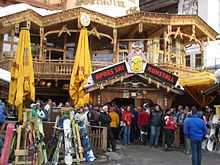Après-ski


As (the) après-ski [ aprɛˈʃi fr ] (from French après, afterwards) is the name given to the amusements offered in winter sports resorts for tourists that are enjoyed after skiing or snowboarding .
procedure
The guests celebrate in restaurants ( ski huts ), umbrella bars or discos , some of which are located directly on the ski slopes , usually consume a lot of alcohol and are entertained by disc jockeys with typical après-ski music. A time highlight is at the end of the lift operation; at the time of the evening meal, operations come to a standstill. Après-ski music is characterized by catchy melodies, which should encourage you to sing along. Schlager and dance are often used . In order to provide an “authentic” setting, the hosts of après-ski venues are also happy to engage local music bands. One of the best-known après-ski songs is Schifoan (1976; German “skiing”) by the Austrian singer Wolfgang Ambros . The music industry offers compilations of typical après-ski music in annual editions of various compilations .
Typical après-ski drinks are alcoholic and sweet (such as Williams pear , vodka with fig and “Flügerl”, a mixture of vodka with blackthorn fruit and sour cherry flavor and an energy drink ), often hot (such as Jagertee and mulled wine ). Regionally, a cocktail made from eggnog and hot milk is offered under the name “après-ski” .
Male après-ski guests with a pronounced urge to gain recognition when flirting are popularly recognized as "après-ski teachers". Helmut Qualtinger sang in Der Après-Schigolo (1957) precisely this type.
Origins
Between 1895 and 1924, the year of the first Winter Olympics in Chamonix , après-ski was used to describe the evening social gathering after a cold day in the mountains, usually with good food and wine. Probably because of its exotic sound, Austrian hosts, for example in St. Anton, adopted the French term for their respective regional variant of evening socializing.
International
- In North America, après-ski is usually more quiet than in the Alps. In bars in the USA and Canada, snacks and small meals are also the order of the day.
various
- According to the Duden , the expression "après-ski" also stands for comfortable or fashionable clothing that you wear after skiing.
- “Après-ski” is often misspelled. In winter sports areas there are numerous variations of the correct spelling on posters, leaflets and on building lettering, such as (with so-called idiot spaces ) "apres ski", "apre's ski" (also with so-called idiot apostrophe ) and very often "après ski".
literature
- Morton Lund: Tea Dance To Disco. Apres-ski through the ages. In Skiing Heritage Journal , Volume 19 # 1, March 2007, ISSN 1082-2895
Web links
Individual evidence
- ↑ Knaur, The German Dictionary, Lexicographical Institute Munich, 1985, page 142.
- ^ Peter Bruges: Twist on the Idiotenhang . In: Der Spiegel 11/1962. Retrieved October 4, 2012.
- ↑ Norbert Rief: The love life on skis . Article dated January 28, 2012, accessed October 4, 2012.
- ↑ Oliver Kuhn: Mountain lion chases ski bunny . Article dated December 10, 2009, accessed October 4, 2012.
- ^ Morton Lund: Tea Dance To Disco. Apres-ski through the ages. In Skiing Heritage Journal , Volume 19 # 1, March 2007, ISSN 1082-2895 .
- ↑ Duden 2000, 22nd edition, ISBN 3-41104012-2 , p. 173.